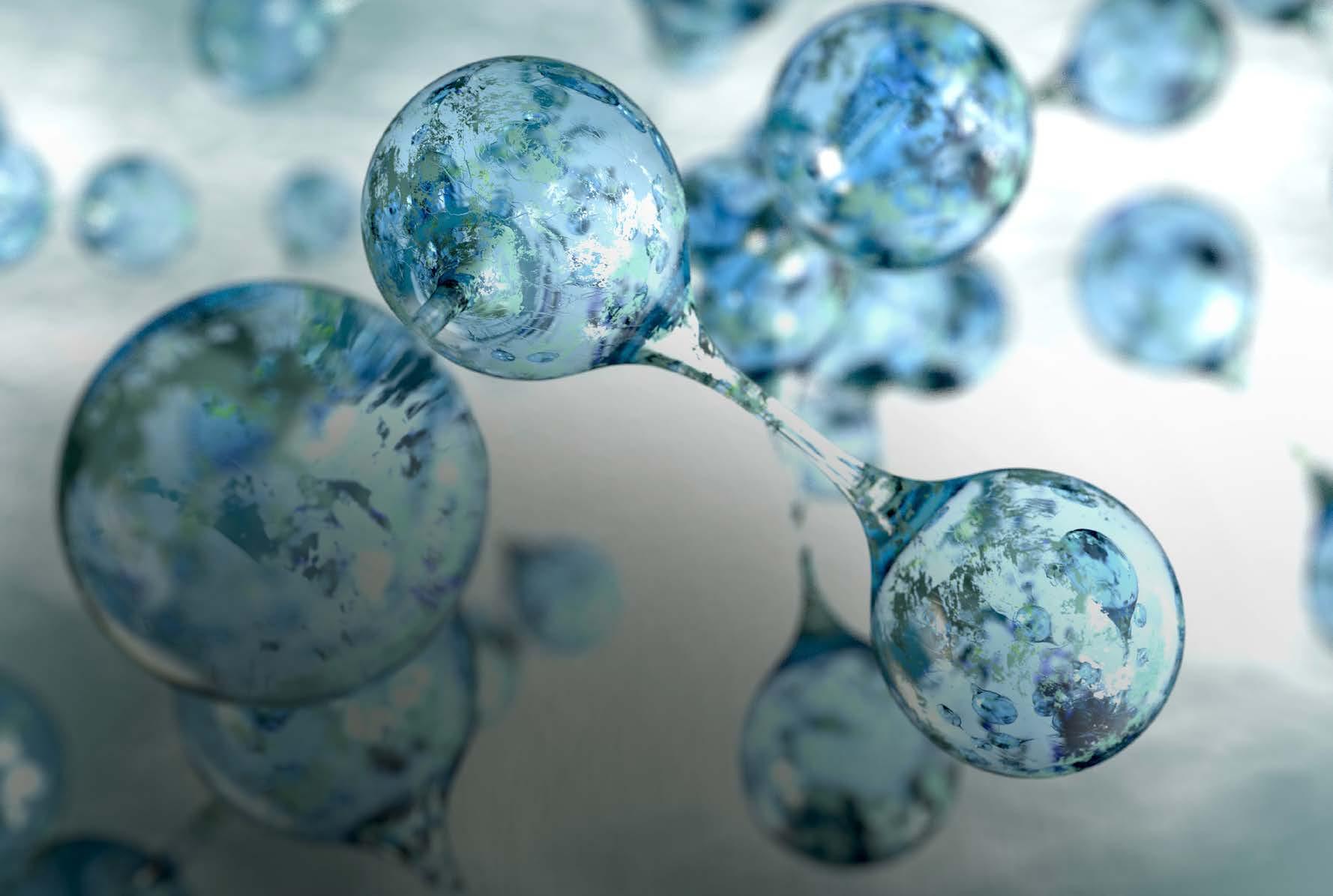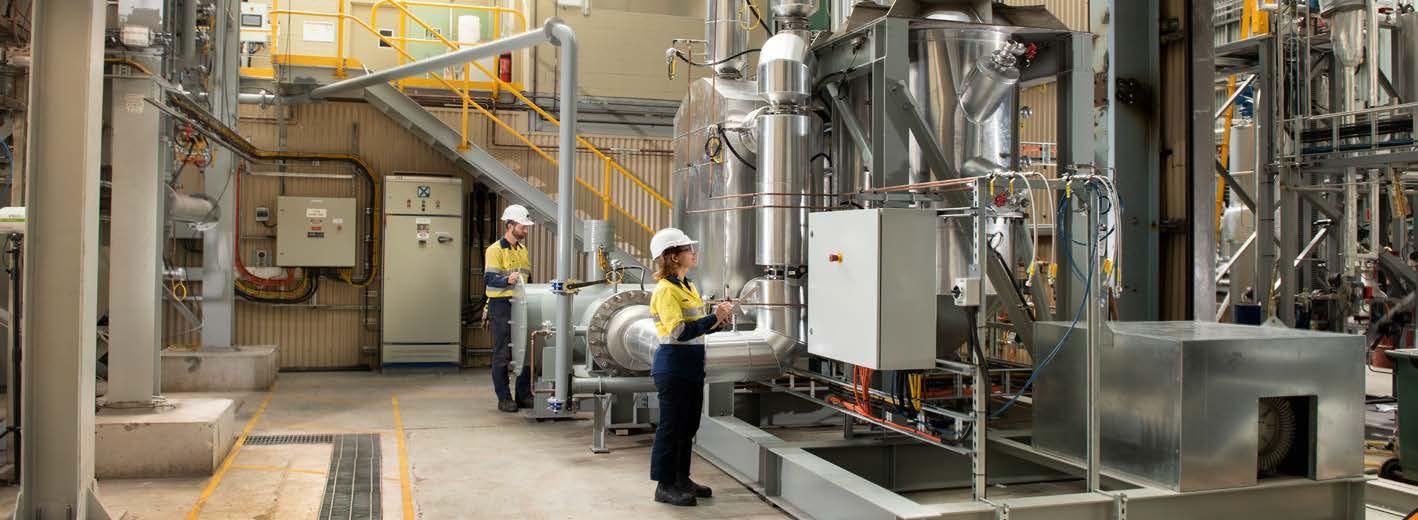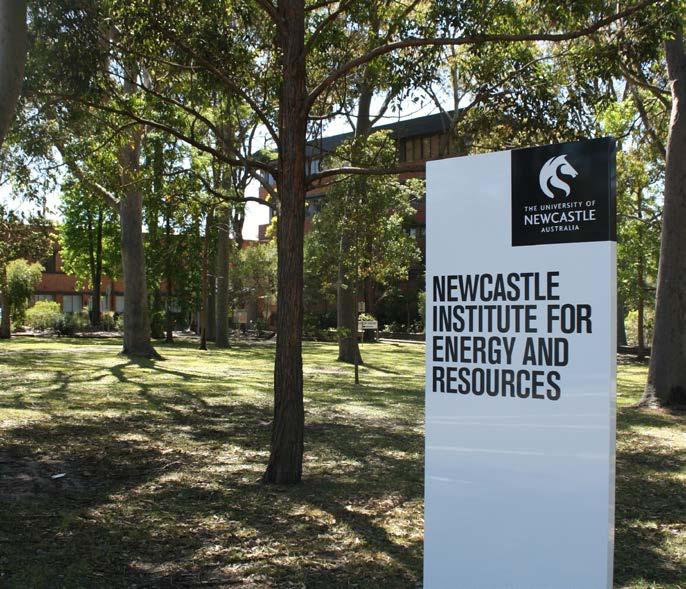HYDROGEN CAPABILITY

NEWCASTLE.EDU.AU/NIER
INTRODUCTION
Australia like many countries, is looking to hydrogen as part of the new energy mix. Hydrogen can fuel transport and power electricity grids, provide energy for heating and industrial processes, and supply molecular feedstock for sustainable chemicals and materials. The variety of ways hydrogen can be produced and used represents a significant opportunity to prosper in the emerging low carbon economy. At the University of Newcastle, we have the skills, capabilities and platforms to drive the development of this emerging area for a more sustainable and economically efficient future.
As an energy, research and innovation powerhouse, the Hunter region has complimentary research, infrastructure and industrial expertise to accelerate renewable hydrogen generation, storage and use. The University of Newcastle is committed to working with regional, state and national stakeholders to develop a regional hydrogen economy that will deliver significant economic benefits including employment and industry growth.
Through collaboration, and by leveraging and strategically positioning existing assets, the University can strengthen the Hunter’s position as an international leader in energy and harness the future hydrogen opportunity.
RESEARCH
As a research-intensive university, ranked in the top 12 of Australian universities, the University of Newcastle’s applied research excellence in engineering and science, is playing a major role in redesigning the way the world is powered to reduce carbon emissions and mitigate the impacts of climate change.
At the University of Newcastle our research and innovation ecosystem delivers market-driven research and development (R&D) to accelerate the technologies, systems and skills needed for Australia’s hydrogen economy.
At the Newcastle Institute for Energy and Resources (NIER) multidisciplinary research centres are focal points for international and national industry engagement in:
• Low emission energy technologies
• Renewable energy systems, efficiency and storage
• Fuels, materials and energy utilisation
Our hydrogen research expertise spans hydrogen production, storage, utilisation and cross-cutting technologies.
INNOVATION
The University of Newcastle is driving national clean energy innovation through the Australian Trailblazing Recycling and Clean Energy (ATRaCE Program). The ATRaCE Program is transforming the way technology readiness, commercialisation and industry-led research is delivered to suppport SMEs and large industries.
The Integrated Innovation Network (I2N) is also delivering to innovators and entrepreneurs, dedicated programs that will develop enterprise skills and impact potential, validate ideas and accelerate solutions to market.
EDUCATION
The University of Newcastle's academic strengths are demonstrated through highly specialised education and research programs and work integrated learning opportunities.
These education and research programs are designed to ingrain deep technical discipline knowledge within a robust, professional perspective framework. Our graduates hone their technical skills by working on real-world problems both individually and in teams to achieve ethical, socially responsible and technically meritorious solutions to complex, open-ended problems.
We offer dedicated industry facing doctoral training for direct industry engagement bringing together multidisciplinary teams to solve specific business challenges, drive product development and commercialisation, and increase impact.
Our graduates are career-ready and are equipped with the skills to solve global issues relating to the priority areas of energy efficiency and sustainability. The University embraces technology and best practices to deliver the best possible student experience. Recognising that the environment is rapidly changing which our students will be entering when they graduate, our education experience will prioritise activities that help develop life-ready graduates who are community-minded, resilient and ready for work.
INFRASTRUCTURE
The NIER Precinct is a 3.8 hectare industrial facility housing technical laboratories for hydrogen research including pilotscale testing and demonstration for hydrogen production, safety, utilisation and storage.
2 | The University of Newcastle
STRONG PARTNERSHIPS
The University of Newcastle has a strong track record of industry led collaboration and research commercialisation supporting the energy and resource sector. Our partnerships are focused on addressing needs, challenges and gaps and facilitating coordination across sectors and end users in a commercially sensitive manner to determine the optimal pathway to drive uptake.

With regional partners we will drive key enabling platforms to support supply chain coordination, connection and development by bringing together the expertise, technologies, resources and knowledge for emerging domestic and export industries.
Through our coordinated approach, the region is poised to support diverse opportunities and business models, recognising that the path to hydrogen deployment and industry uptake have potential to unfold in a number of ways.
Our University is working with a variety of stakeholders to begin the attraction of new industries and investment, and lead hydrogen research development and demonstration.
THE HUNTER HYDROGEN TECHNOLOGY CLUSTER - NEWH2

The Hunter Hydrogen Technology Cluster (NewH2) is the only Regional Cluster for NSW and is supported by several local industry associations, businesses, TAFE and the University of Newcastle. It spans the Hunter, Central Coast and Orana regions of the state.
With seed funding from the National Energy and Resources Australia (NERA) and the University of Newcastle, NewH2 is working in partnership with Hunter Business Chamber, Australian Industry Group, NSW Energy and Resources Hub, Committee for the Hunter, Department of Regional NSW. NewH2 takes a market-driven, industry-led approach to support knowledge exchange and skill development and is facilitating the growth and demonstration of new technologies, products and services.
newh2.net.au



NSW ENERGY AND RESOURCES KNOWLEDGE HUB


The NSW Energy and Resources Knowledge Hub is supporting strong links between industry, research organisations and government to drive innovation and growth for Australia’s energy and resources sector. It is focused on new tools, services and pathways for SMEs, breaking down barriers to collaboration.
energyinnovation.net.au
NSW DECARBONISATION INNOVATION HUB
The University, through NIER, will co-host the NSW Decarbonisation Innovation Hub with UNSW, a NSW Government Net Zero Initiative. The Hub will help fast-track research, development and commercialisation to drive solutions for a low emissions economy across the three focus areas of Electrification & Energy Systems, Land & Primary Industries, and Power Fuels including Hydrogen.
The University of Newcastle | 3
HUNTER HYDROGEN HUBS
The development of Hunter Hydrogen Hubs enable groups of hydrogen users to work together with common infrastructure for the local production, use and distribution of hydrogen. The Hub model works to reduce risk and costs for participants through coordination and economies of scale. The University is actively engaged with a number of regional Hydrogen Hubs located at the Port of Newcastle, Kooragang Island and the Upper Hunter. The Federal Government recently announced $41 million for the Port of Newcastle and Macquarie Capital's joint venture and $41 million for Origin Energy's partnership with Orica. Their respective projects will focus on green hydrogen production and sustainable use cases to enable future industries in the region, including the supply of hydrogen for heavy industry and transport, conversion into green ammonia, and blending hydrogen into natural gas pipelines.
HUNTER HYDROGEN ROADMAP
The Hunter will be Australia’s leading hydrogen hub and technology cluster, demonstrated by excellence in research, innovation, technology and education, production, use, export and employment participation across the hydrogen supply chain.

The Hunter Hydrogen Taskforce – an initiative led by the University of Newcastle, identified this significant opportunity for the region and has been working to outline a Roadmap that will position the region, attract investment and drive economic activity into the future.
The Hunter Hydrogen Roadmap provides a pathway for the Hunter to establish a thriving domestic and export hydrogen industry, outlining the targeted actions and investments across sectors and the region over the short, medium and longer terms.

The strategic vision of the Roadmap is for the Hunter to be Australia’s leading hydrogen hub and technology cluster, demonstrated by excellence in research, innovation, technology and education, production, use, export and employment participation across the hydrogen supply chain.
The Roadmap articulates the strategic enablers of regional collaboration, research and development innovation and investment attraction. As a foundational framework, the Roadmap will address workforce capabilities aligned to industry development and policies, safety and standards, and community engagement.
4 | The University of Newcastle
hunter.org.au
RESEARCH AT A GLANCE
At the University of Newcastle, there are a number of multidisciplinary teams working in collaboration with government bodies and industry to expand innovation opportunities and collectively solve challenges in response to industry needs. We recognise the importance of reducing emissions and investing in research which enables the shift to a clean energy future. Our researchers encompass a broad range of expertise relevant to hydrogen storage, production, utilisation and cross cutting technologies. The hydrogen capabilities across the University include the following:
HYDROGEN PRODUCTION
The University of Newcastle understands the need to achieve greater efficiency in hydrogen production and has already established strong capabilities across the following areas of hydrogen production:
• Biological hydrogen production (microbial electrolysis; fermentation of algal and bacterial cultures)
• Light based conversion (photocatalytic water splitting; photo electrochemical water splitting)
Thermal water splitting (two-stage solar thermal water splitting; multi-stage solar thermal water splitting; high temperature catalytic water splitting; chemical-looping water splitting)
• Electrolysis (polymer electrolyte membrane electrolysis of atmospheric moisture; solid oxide electrolysis)
Biomass and waste conversion (biomass and waste gasification; biomass and waste pyrolysis; biogas reforming)
• Fossil fuel conversion (coal gasification; coal / oil pyrolysis; natural gas pyrolysis or methane cracking; oxidative conversion of natural gas; steam methane reforming; dehydrogenation of liquid hydrocarbons)
HYDROGEN STORAGE
Our research in hydrogen storage encompasses the development of a range of technologies and solutions to store hydrogen in the following areas:
• Compression (electrochemical; mechanical; ionic liquids; metal hydrides)
Chemical storage (metal organic frameworks; ammonia; toluene; dibenzyltoluene; synthetic methane; methanol; dimethyl ether; hydrides-chemical; hydrides-metal)
HYDROGEN UTILISATION
Through the emerging importance of delivering clean energy solutions, the University of Newcastle is working towards the goal of decarbonisation and offering meaningful strategies to reduce emissions with the following hydrogen utilisation capabilities:

Gas blending (gas metering; hydrogen separation)
• Transport (ammonia internal combustion engines; hydrogen enriched fuel in internal combustion engines) Industrial processes (steel processing; pulverised coal injection applications; methane and methanol production)
• Batteries (thermal batteries based on metal hydrides; flow batteries)
CROSS CUTTING
Many sectors are seeking to adopt hydrogen technologies to achieve sustainable energy targets and our researchers at the University of Newcastle are accelerating the development of cross-cutting, clean hydrogen technologies through the following capabilities:
• Hydrogen materials (nano-materials; nanocatalysts; hydrogen induced cracking, steel embrittlement and material durability)
• Electro-chemistry (batteries; fuel cells; electrolysis)
• Modelling (hydrodynamic / computational fluid dynamics; multiphase fluid beds; computational chemistry / physics; machine learning & artifical intelligence; technoeconomic; numerical modelling; micro / smart grids; policy, regulations and social licence; hydrogen safety)
The University of Newcastle | 5
CENTRES INVOLVED
PRIORITY RESEARCH CENTRE FOR FRONTIER ENERGY TECHNOLOGIES AND UTILISATION
The Priority Research Centre for Frontier Energy Technologies & Utilisation (PRCFETU) conducts cutting edge research on emerging energy technologies, with particular focus on the nexus between energy, water and carbon emissions which culminates in national priority areas such as the abatement of greenhouse gases and clean and sustainable energy production. Partnering with government and industry, the Centre provides tailored research in hydrogen spans methane gasification for hydrogen production, photocatalytic water splitting and production of advanced catalysts and supports.
GLOBAL INNOVATIVE CENTRE FOR ADVANCED NANOMATERIALS
The Global Innovative Centre for Advanced Nanomaterials (GICAN) is designing and developing an advanced materials platform for the generation, storage and utilization of hydrogen using naturally available resources. GICAN is actively working on designing carbon-based thermo, electro and photocatalytic nanostructures for the generation of clean hydrogen with the help of the visible sunlight and the electricity generated from the solar cells. Extensive research is being carried out on the theoretical understanding of the interaction and the diffusion of the hydrogen gas in the developed nanostructures using density functional theory to design the next generation hydrogen storage systems.
CENTRE FOR IRONMAKING MATERIALS RESEARCH
The Centre for Ironmaking Materials Research (CIMR) is a partnership between NIER and BHP, aimed at defining the link between fundamental iron ore and metallurgical coal properties and their performance in ironmaking process. The Centre’s research aims to optimise the use of Australian iron ore and metallurgical coal. With the global shift to low-carbon iron and steelmaking technologies, the Centre is dedicated to providing technical support for the Australian iron and coal industry to supply fit-for-market products and transition to a more sustainable position in the global marketplace. The Centre also aims to assist ironmakers to decrease their greenhouse gas emissions.

CENTRE FOR INFRASTRUCTURE PERFORMANCE AND RELIABILITY
The Centre for Infrastructure Performance and Reliability (CIPAR) is at the international forefront in assessing the reliability, safety, durability and management of buildings, bridges, pipelines, aviation, and other infrastructure systems. The pioneering research at CIPAR includes risk and reliability assessment, corrosion of infrastructure, and structural masonry. The principles of risk and reliability have been applied to a range of other hazards and engineering systems, such as the risk-cost-effectiveness of counter-terrorism measures for aviation security, and the effects of climate change on built infrastructure.
CENTRE FOR BULK SOLIDS AND PARTICULATE TECHNOLOGIES
The Centre for Bulk Solids and Particulate Technologies (CBSPT) is actively involved in both fundamental and applied research on a range of problems associated with bulk solids and particulate technology. Research areas include storage, flow, processing and transportation of bulk solids with a focus on waste biomass for hydrogen power generation.
PRIORITY RESEARCH CENTRE FOR GEOTECHNICAL SCIENCE AND ENGINEERING
The Priority Research Centre for Geotechnical Science and Engineering (PRCGSE) develops material models that accurately describe the macroscopic behaviours of materials using new models and innovative computational methods. The centre's hydrogen research relates to pipeline infrastructure, hydrogen transport and interaction with high pressure pipeline geotechnics.
CENTRE FOR ORGANIC ELECTRONICS
The Centre for Organic Electronics (COE) is a global leader in the exciting emerging field of 'functional printing', which uses conventional printing technologies to manufacture clever, high performing, low cost materials to help solve some of the world's greatest challenges. The Centre for Organic Electronics (COE) is marrying the creation of clever electronic inks with well-established printing technologies to address global challenges spanning renewable energy, health & medicine, and mining safety.
HYDROGEN TECHNOLOGY AND MATERIALS GROUP
The Hydrogen Technology and Materials Group unites applied and theoretical expertise alike of several academics from the School of Engineering at the University of Newcastle. More specifically, our expertise comprises photocatalytic hydrogen generation, design of next-generation fuel cell stacks, infrastructure durability, advanced materials science, and manufacturing.
6 | The University of Newcastle

The University of Newcastle | 7
NEWCASTLE INSTITUTE FOR ENERGY AND RESOURCES
CONTACT US nier@newcastle.edu.au
2022 1010 | CRICOS Provider 00109J








